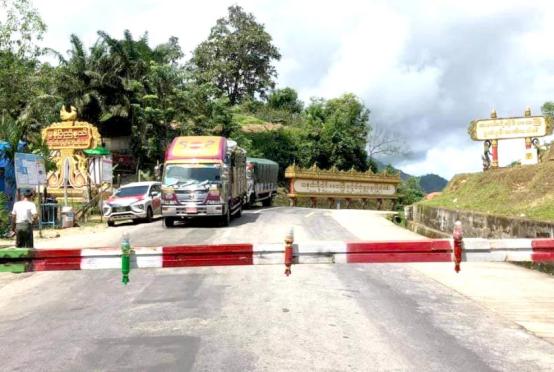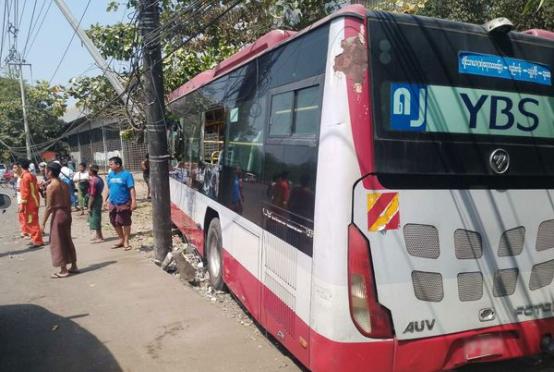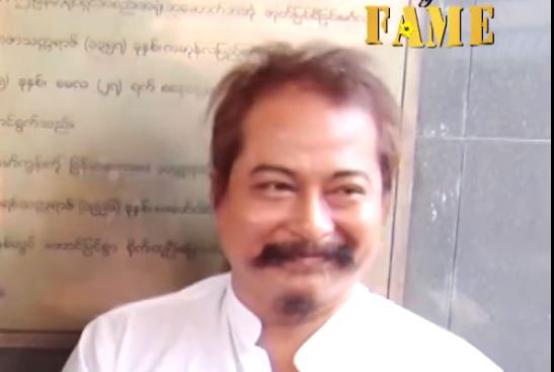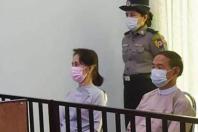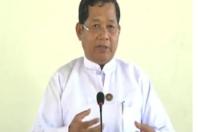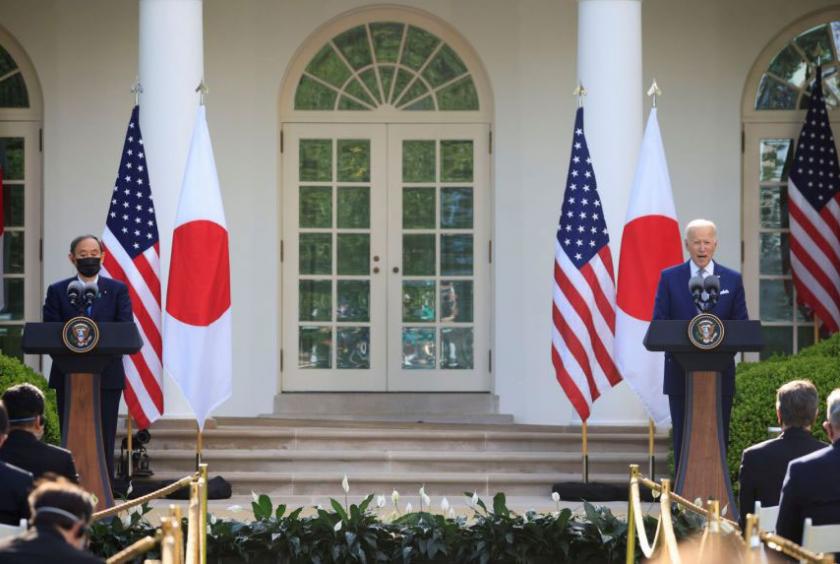
WASHINGTON - The United States and Japan called for "peace and stability across the Taiwan Strait" in a joint statement after US President Joe Biden and Japanese Prime Minister Yoshihide Suga met on Friday (April 16), a rare mention of Taiwan in the joint communiques of both countries that comes amid rising tensions with China.
It was the first time the US and Japan's top leaders have explicitly mentioned Taiwan in their joint statements since 1969, although their defence and foreign ministers similarly "underscored the importance of peace and stability in the Taiwan Strait" in a statement last month.
China regards Taiwan as a breakaway province to be reunified, by force if necessary, and has increasingly sent warplanes into Taiwanese airspace. Tokyo, meanwhile, sees Beijing's actions as unilateral attempts to change the status quo in the East and South China Seas, and as threats to its own security.
Washington and Tokyo said they encouraged the peaceful resolution of cross-strait issues in Friday's lengthy statement, titled "US-Japan global partnership for a new era", a document which Mr Suga called a guiding post for their alliance.
It was issued hours after Mr Biden hosted Mr Suga for talks in Washington.
Mr Suga's visit, the first by a world leader during the Biden administration, underscored the importance of the Indo-Pacific region to the Biden administration’s foreign policy and the centrality of Japan to US' strategy.
Both leaders highlighted the strength of their alliance and vowed to together take on challenges from China, whose increasingly assertive stance in the region has unsettled both nations.
"We committed to working together to take on the challenges from China and on issues like the East China Sea, the South China Sea, as well as North Korea, to ensure a future of a free and open Indo-Pacific," said Mr Biden at a joint press conference in the White House Rose Garden.
"We’re going to work together to prove that democracies can still compete and win in the 21st century," he added.
New partnership
Mr Biden announced that Japan and the US have launched a new partnership named the Competitiveness and Resilience Partnership (Core), under which they will advance innovation, end the Covid-19 pandemic and guard against future ones, combat the climate crisis, and enhance people-to-people ties.
The US will invest US$2.5 billion (S$3.3 billion), and Japan US$2 billion, into developing and deploying 5G and next-generation mobile networks, according to a White House fact sheet on the partnership.
Mr Biden said that the US and Japan will together promote secure and reliable 5G networks, increase cooperation on supply chains for critical sectors like semiconductors, and drive research in areas such as artificial intelligence and quantum computing.
All these are areas China seeks to become dominant in, and in an implicit rebuke of Beijing, Mr Biden said: "Those technologies are governed by shared democratic norms that we both share, norms set by democracies, not by autocracies."
MORE ON THIS TOPIC
China resolutely opposed to US-Japan joint statement: Chinese embassy in US
US, Japan warn against 'destabilising behaviour' by China
While China loomed large in their discussions, Japan - which counts China as its largest trading partner and the US as its second largest - was also careful to appear not to be isolating China.
Mr Suga said that while Japan and the US will take the lead to promote the vision through concrete efforts, they will also cooperate with others in the region, including Asean, Australia and India.
He said that he and Mr Biden "had serious talks on China’s influence over the peace and prosperity of the Indo-Pacific and the world at large", adding: "We agreed to oppose any attempts to change the status quo by force or coercion in the East and South China Seas, and intimidation of others in the region...
"At the same time, we agreed on the necessity for each of us to engage in frank dialogue with China."
Mr Suga said that Mr Biden once again affirmed that Article 5 of the US' and Japan’s security treaty applied to the Senkaku Islands, known as Diaoyu in China, in the East China Sea.
Japan controls the uninhabited islands, which China also claims, and under the treaty, the US is obliged to defend Japan if its territories are attacked.
Climate change
On climate change, both nations are committed to taking aggressive action, said Mr Biden, who will next week host world leaders, including Mr Suga, at a virtual summit on climate change.
Japan and the US have yet to publicly release updated goals on how they will achieve net zero carbon emissions by 2050, and are expected to do so soon.
Mr Biden said that they will work together to advance clean energy technologies and help nations throughout the Indo-Pacific region decarbonise their economies.
President Joe Biden hosted Japanese Prime Minister Yoshihide Suga for talks in Washington. PHOTO: EPA-EFE
Tokyo Olympics
Mr Suga told Mr Biden that Japan will do everything in its power to contain Covid-19 infections and hold a "safe and secure" Olympic Games this year.
"Japan is listening to and learning from WHO and experts" and the country is doing its "utmost" to prepare for the Tokyo Games, Mr Suga said.
"They (the organisers) are doing everything possible to contain infection and to realise safe and secure Games from scientific and objective perspectives," Mr Suga said.
"I told the President about my determination to realise the Tokyo Olympic and Paralympic Games this summer as a symbol of global unity. President Biden once again expressed his support for this determination," the Prime Minister added.
After being postponed by a year due to the coronavirus pandemic, the Tokyo Games are due to open in July. But uncertainty about their viability has grown amid rising virus cases, and Mr Suga's pledge of safety comes as the coronavirus crisis has complicated preparations.
Experts are warning of the risks of the Games going down in history as a super-spreader event, instead of the much-hoped-for symbol of triumph over Covid-19.
Japan on Friday expanded quasi-emergency measures to four more prefectures, bringing the total to 10, and raising questions over whether the Olympics can really proceed on schedule in under 100 days.


